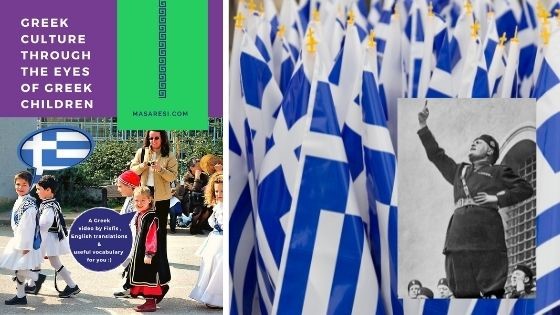Greece
The Greek Oxi Day through the eyes of schoolchildren
October 28th
It is again this time of the year; October 28th and one of Greece’s major National Celebrations or Public Holidays. So first of all, on this day you can say and wish everybody; “χρόνια πολλά” – xronia polla!
A lot is written about this celebration and its important history, so no need to write the same thing over and over again. If you are not aware at all, then feel free to read more about it, by clicking here.
So in this article, only a few words about how young children do experience this, in Greece of course.
How primary school children experience the OXI day
When our children went to Greek public primary school, they had to learn a small text or poem by heart or write an essay about this important day in Greece’s history, every single year again.
It started with the first schoolyears when writing an essay was still too much to ask, but learning heroic poems by heart, was just a matter of drills…
Parents were invited to school on the 27th of October, to encourage and see their children reciting poems or singing heroic songs. Every child got enormous applause and “bravo’s”, but I do not think there was one child that actually had any idea what he/she was talking or singing about. It actually could have been another language to them..and the next day they could just forget everything.
But never mind, when the parents are happy, the children are happy 🙂
Moving on to 3-4th grade, when they could hardly write a proper paragraph about a subject related to their age, they were asked to write an essay about this historical event. As a parent, I did not see the sense of it, given it was obvious this is a part of history that tour young children were not yet able to understand. When reading their essays, this became even more obvious. A waste of time, in my foreign eyes.
Of course, I believe history is one of the most important lessons in schools, so no problem with the yearly repetition. But explaining World War II, the tempted invasion of Mussolini, his relation to Hitler, to an 8-11 year old, is not an easy thing to do.
However, our children seemed to have a lot of fantasy and made up many other stories of countries involved, ancient heroes or Greek gods fighting against Mussolini and the Turks!, They were completely mixing up the historical events of October 28th and March 25th, the latter another important national holiday, related to the independence of Greece from the Turks.
I did not bother too much myself, was actually amused by it, but my Greek husband could not believe his eyes when reading their little essays. As a result, he felt embarrassed and declared he would not go to future parent’s meetings anymore, being afraid the teachers would condemn him for not teaching his children proper Greek history 🙂
In the end, in Greece, it is not rare that a big part of the lessons are thought by the parents at home, or another family member, instead of in the classroom… Because we are not trained as primary teachers, it is for sure something we had decided not to do ourselves. Looking back now, we have actually regretted our decision. But anyway, that is another story…
As a non-Greek mother, who did not grow up herself in Greece, neither with the traditions of this OXI day, I will never forget all the anecdotes (and discussions with other parents) related to October 28th.
I blamed myself that our children were apparently a bit ‘behind’ in the history lesson.
But then, some years ago, I was very amused to stumble upon one of the videos of Fisfis, a known Greek stand-up comedian, who had interviewed schoolchildren about their knowledge of Greek history, and not only…
Lambros Fisfis keeps on creating upbeat, fun content, and I really like his humor. I felt it is also nice to share this video with anybody interested in learning Greek or learning more about Greece. In this video, instead of his usual stand-up comedy, Fisfis sits down with elementary school children to make small talk about – Greece!
Actually, this video was very recognizable for me, and brought me back to the schoolyears of our children.
I therefore have written down the entire text in Greek, and translated it to English. It became a nice eBook, and it is called;
“Practice your listening skills with Lambros Fisfis, while learning about Greek culture, through the eyes of Greek children!”
In the video, Fisfis asks several children what Greece means to them, what changes they would make to the Greek flag or national anthem if they could, what is the greekest thing they know, and which modern Greek personality deserves his/her own sculpture. The children’s answers are unexpected, funny and sometimes kind of unbelievable.
And of course, also Mussolini was mentioned once again 🙂
When Fisfis asks one of the children;
“When we talk about Greek Traditional music, what comes to your mind?”
Όταν λέμε παραδοσιακή ελληνική μουσική, ποιος σας έρχεται στο μυαλό;
the answer of the child is; Ο Μουσολίνι! Mussolini!
So how a 10-year old ends up answering this?
Well, this refers to the Greek song Κορόιδο Μουσολίνι (Mussolini, You Fool), which was sung by Greek singer Sophia Vembo in 1941 to inspire confidence throughout the Greek troops who were going to the Greek-Albanian border to fight against the Axis alliance (Germany and Italy).
It addresses Benito Mussolini, the leader of the National Fascist Party, to suggest that the Italian forces stand no chance in front of the marching Greek army, who will win the battle and make all the way to Rome. This, of course, did not happen but students in schools across the country still sing this song on October 28th, known also as Ohi Day (Ημέρα του όχι), which commemorates the rejection by Greek dictator Ioannis Metaxas of the ultimatum made by Italian dictator Benito Mussolini on 28 October 1940. This ultimatum, which was presented to Metaxas by the Italian ambassador to Greece, Emanuele Grazzi, demanded Greece allow Axis forces to enter Greek territory and occupy certain unspecified “strategic locations” or otherwise face war. Metaxas refused to do so, marking the beginning of Greece’s participation in World War II.
It was after that that Hitler came down to Greece, and….
Anyway, maybe now, with this explanation above, you understand what a Greek essay of a 10-year old will look like, and why they believe Mussolini might be even a Greek singer 🙂
If you are curious, here is the link to the song the children are learning in school; https://www.youtube.com/watch?v=vEAQB0NJPqI
Mussolini = Duce
in case you did not know, In the song, you can hear the word Duce, which is a word, derived from the Latin word dux = leader”. The National Fascist Party leader Mussolini was also called Il Duce.
By the way, also my father, living in Belgium, was more than astonished when our 6-year old son heard a discussion on the radio (in Dutch), and heard the word “Duce”.
He immediately responded and said, ” ha, what do they say about Mussolini”?
Do you know Mussolini, my father asked?!!
And Yason answered: yes, it is my favorite song…!
He started singing the song right away, when marching around in the living room, with a big smile on his face, not having any idea what he was actually singing about.
Fortunately, also my father had no idea since it was all in Greek , but was impressed about the Greek education 😉
In the meantime, we are very happy and lucky we never had to experience a war ourselves, neither our children, and I hope this will remain the same for all the next years and generations to come.
If you are interested in reading more incredible and funny talks with children, then take a look at the Fisifis eBook.

